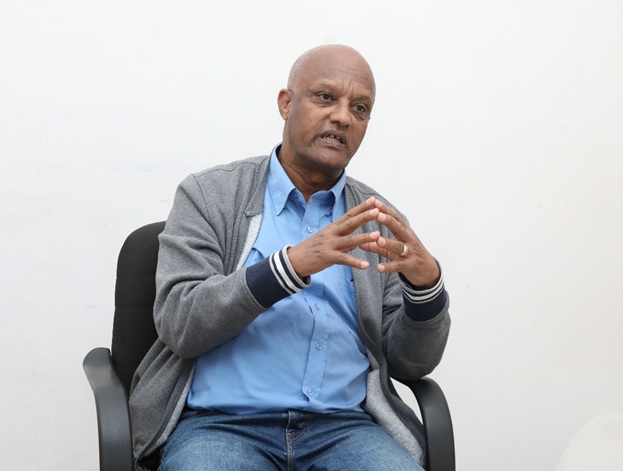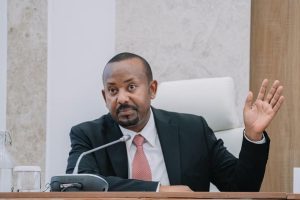
Ethiopia, a land of rich history and vibrant cultures, stands at a crossroads. As the nation advances towards modernization, one question dominates the conversation: how do we prepare our young generation to succeed on the global stage while maintaining their cultural identity? To explore this vital issue, this journalist had a chance to discuss with Sahilu Baye, a psychologist, child development expert, project manager and community builder whose lifelong work embodies the principles of education, service, and national pride. Using his knowledge and experiences Sahilu is serving his country by providing training to parents, preschool teachers, teacher assistants, and child caregivers working in orphanages. Here is our conversation:
Ethiopia is a nation proud of its history, yet we face many challenges in empowering our youth. From your perspective, what are the most pressing issues facing young Ethiopians today?
Indeed, Ethiopia is a country with an incredible past, but we must confront the realities of today. Our youth are growing up amidst economic hardships, limited access to quality education, and a declining culture of reading and critical thinking. Many are distracted by digital entertainment, which often replaces the quiet, reflective habits needed for deep learning. Moreover, I see a weakening of moral values—honesty, respect, and responsibility—that are essential for societal cohesion. These issues threaten our future if we don’t address them collectively.
You mentioned the decline of reading habits. How important is reading in developing a young person’s character and skills?
Reading is fundamental. It opens minds, fosters critical thinking, and connects young people with their history, culture, and the wider world. In Ethiopia, storytelling was once a vital way of passing down morals and traditions. Today, the ease of instant digital content has diminished that practice. But if we want our youth to be innovators and responsible citizens, we must rekindle their love for books and reflection. I often tell young people, “A nation that reads is a nation that leads.”
What role should education play in nurturing these qualities?
Education is the most powerful tool we have. But it must go beyond textbooks and exams. It must inspire curiosity, moral responsibility, and cultural pride. Schools should have libraries, storytelling sessions, and activities that make reading exciting. We need to embed lessons on ethics, history, and civic responsibility into our curricula. When young people understand their roots and values, they develop confidence and a sense of purpose. As I always say, “Education must be a journey of self-discovery, not just memorization.”
Ethiopia is a remarkably diverse country. How can we leverage this diversity to strengthen our youth and society?
Our diversity is our greatest strength. From languages to traditions, it’s a treasure trove of cultural assets. I believe education systems should actively incorporate local history, arts, and languages. When young Ethiopians learn about their heritage, they develop pride and a sense of belonging. Celebrating festivals, storytelling, and indigenous arts reinforce this identity. Furthermore, cultural knowledge can be turned into economic opportunities traditional crafts, music, cuisine helping our youth build sustainable livelihoods while preserving their heritage.
Ethical values are essential, yet sometimes they seem to be fading. How do we rebuild a moral backbone in our society?
That’s true. Honesty, respect, responsibility these are the moral foundations of a resilient society. To rebuild them, we need deliberate effort from families, schools, and communities. Storytelling, mentorship, and civic education are powerful tools to instill these values. I often remind young people, “Character is more valuable than wealth. Cultivate integrity, and you will be the pillars of Ethiopia’s future.” Ethical leadership begins within each individual, and it’s our collective responsibility to nurture it.
You’ve had an inspiring journey yourself. Could you share a bit of your personal story?
Certainly. I was born in Lalibela in 1952 E.C., into a family that valued service and community. My father, Baye Alemu, was instrumental in developing parts of Lalibela’s infrastructure; his dedication to service profoundly influenced me. Growing up, I faced many hardships: walking miles to school, limited access to books, and living through political upheaval, but I remained committed to learning. I was fortunate to excel in mathematics and English, earning the nickname “Professor” from my friends, which motivated me to push further.
Later, I studied psychology at Addis Ababa University during a turbulent period in Ethiopia’s history. My thirst for knowledge took me abroad to Israel, where I earned a master’s degree in Child Development at the University of Haifa.
In Israel, I attended specialized training programs at Mount Carmel, including “Education of the Young Child with Special Needs” and “Psychosocial Care for Children Affected by HIV & AIDS.” I also completed HIPPY (Home Instruction Programs for Pre-Youngsters) home instruction training at Hebrew University and pursued a one-year master’s in Child Development at the University of Haifa. During those periods I had a chance to meet international psychology students and faced tough competition; however, I was honored for my achievements.
Those experiences broadened my understanding of how to nurture resilient, morally grounded youth. Returning home, I dedicated myself to community service and founded educational institutions and organizations that empower young people.
What is your hope for Ethiopia’s youth in the coming years?
My hope is that Ethiopia’s young generation will develop into confident, skilled, and morally upright leaders. They should be proud of their heritage, eager to learn, and committed to integrity. We must build systems where schools, community programs, and policies that support lifelong learning, innovation and ethical leadership.
What roles do leaders and society as a whole need to play?
Everyone has a part. Leaders must serve as role models acting with honesty and humility. Parents need to nurture reading habits and cultural pride at home. Teachers should inspire curiosity and moral values. Communities can organize cultural festivals and storytelling events. And policymakers must prioritize education reform, teacher training, and youth entrepreneurship.
Can you tell me about the programs you’ve implemented at the Enrichment Center that provides a holistic service to children?
Enrichment Center works focusing on supporting children through capacity-building training for schools and childcare facilities. The Center also offer counseling services to help children cope with educational and social challenges. What is more it provides training and support to educators and caregivers.
What is the main goal of the Enrichment Center?
Giving aid is not our primary aim. Our core objective is to lay a solid foundation for comprehensive care and support for children. We achieve this by providing scientific, evidence-based training to childcare professionals across Ethiopia, ensuring children grow up with the care and attention they deserve.
What are some recent projects and challenges your organization faces?
We’ve participated in constructing classrooms at Awoday Primary School in Harar and a clinic and dining hall at King Michael School in Dessie. Recently, however, foreign aid restrictions and legal pressures have hampered our efforts. Still, we remain committed, gathering volunteers and increasing service delivery to reach more children.
How do you ensure that Ethiopian values are maintained in your training?
We blend scientific, international best practices with Ethiopian cultural and moral values. Our training programs conducted at schools like Addis Ababa, Addis Alem, Lalibela, Dessie Wizero Sehn and Woldiya Adengur are good examples to this.
Any final words for the young people of Ethiopia?
My message is simple: “Focus on building yourself through reading, through honest work, and through embracing your cultural identity. Save yourselves from distractions and aim to serve your country with integrity. If you develop yourself in these ways, you will be the architects of a powerful Ethiopia one that respects it’s past and confidently embraces its future.”
BY LELUSEGED WORKU
THE ETHIOPIAN HERALD FRIDAY 13 JUNE 2025




